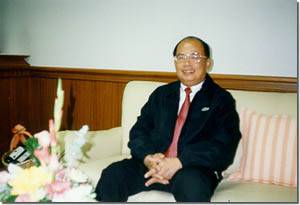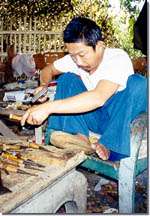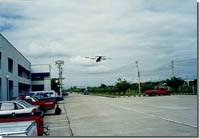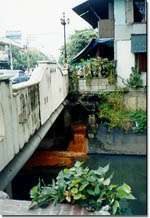|

"WE HAVE THE CHANCE TO CHANGE
THIS CRISIS. IT WILL BE BETTER!"
David Hardy invited the Governor,
Tan Kosin Kesthong, to review some Chiangmai challenges - and to foresee
what the New Year may offer

DH: Tourism is our biggest industry. But it faces many challenges.
Is this a healthy situation for the province?
Governor: "Tourism and service is the most important aspect
of the economy of Chiangmai. It brings Chiangmai more than 30,000 million
baht a year - 23 % of the Gross Provincial Product. Each year more than
3 million people visit Chiangmai. After the tragedy of September 11th in
the USA, Chiangmai's tourism was affected. Many American tourists cancelled.
However, the statistics of guests who stayed in the hotels and guest houses
increased by 15% as there were more tourists from Asia, especially Chinese.
Tourists from other regions changed to Thailand and Chiangmai because it
is safer and more peaceful.
In order to develop Chiangmai tourism, we have plans for attracting
people to come more often, stay longer and spend more by promoting old
culture and the beauty of nature. Examples are cultural tour programmes,
health tours, staying in local people's homes and eco-toursim, for example
bird watching at Doi Inthanon.
Holding international conferences is another way to promote Chiangmai.
Luckily, we are going to get the budget to build a conference and international
exhibition centre soon, opposite the Railway Station. The Chiangmai administration
sees the importance of facilitating tourists and keeping them safe. So
we are trying hard to get rid of cheats, especially people selling fake
jewelry and air tickets and so on. We believe that we have the chance to
change this crisis. It will be better!
Apart from agriculture, the other important industry which supports
the growth of Chiangmai is handicrafts. We have the raw materials and the
craftsmen. Many of our products are famous internationally: wood carving,
silverware, lacquerware, porcelain, silk and cotton for example. To improve
the quality of the products we have the "One District One Product"
project - improving manufacturing, packaging and marketing. The market
targets are local, domestic and foreign. We are the first Province in Thailand
to name the brand of the products - Chiangmai Brand - to guarantee the
quality."

DH: People are now much more aware of safety in the air. Why
do most aircraft serving Chiangmai circle over the city instead of the
rural area west of Doi Suthep?
Governor: "The Air Force Centre in charge of controlling
air traffic states that to the west of Chiangmai International Airport
is the high mountain, Doi Suthep. It is difficult to fly over there. The
runways and flying routes are from north to south. These routes have less
people living along them, compared with the eastern area where many people
live in the city. The Air Force Radio Centre has internationally-standardised
rules for flying control which every pilot must follow."

Low overheads - a Chiangmai
challenge which seems impossible to change.
DH: What do you feel about our road system, road safety standards
and lack of bus services?
Governor: "Over the past 10 years, Chiangmai city has grown
so very fast that the basic road structure has not been effective enough.
So the problem of traffic jams became worse. The Provincial Committee has
tried to solve this problem by improving road surfaces, setting up one-way
traffic systems in the centre, using computerised traffic lights and building
new roads. We are constructing new 4 lane ring roads. Road 3 from the Salaklang
reaches the Chiangmai-Hang Dong Road near the Lotus Superstore. Road 2
is from the Army area, reaching Chiangmai-Hang Dong near the Samoeng intersection.
Over-passes have been built at major intersections, but public opinion
surveys show that underpasses would be more popular. So we are proposing
them, starting with the Superhighway junctions with the Mae Rim (Chotana)
Road and Doi Saket (Kaew Nawarat) Road.
The other way to solve traffic problems is to deal with people. We see
this aspect as very important, emphasising training for children and teenagers
and strong enforcement of the traffic laws.
One way city streets are mostly in 'square' of the moat. There are many
intersections and crossroads and the streets are narrow and busy. One way
streets can reduce jams and accidents if people follow the traffic rules
strictly. Law enforcement is the responsibility of Chiangmai Traffic Police.
They are more strict to arrest law-breakers who do not follow the correct
route since the "Traffic Order" policy began on December 1st,
2001. Presently, public transportation is still a Chiangmai problem since
we do not yet have a public bus service. We used to have, but it lost money
so we stopped in 1994. The red pick-up 'Song Taew' or 'Seelor' service
is not standardised enough to serve the transportation. The committee is
meeting to find the solution, to improve them to an international standard
for serving people and encouraging them to use more public transportation
instead of private cars."
DH: I see the police doing more to control exhaust pollution,
but what about water pollution in the river and the canals?
Governor: "I am not happy about water pollution. Prime Minister
Thaksin has talked specifically about the Mae Kha canal which runs through
the centre and is encouraging help. We have to find the polluters and persuade
them to stop."

Bright red-orange coloured
liquid waste flows into the "stinking klong" as it passes under
Sridonchai Road.
DH: Owners of night entertainment businesses are worried about
rumours of "zoning", which has been implemented in Bangkok and
Pattaya. Will some be forced to move?
Governor: "The proposal to limit young people from staying
out late at night is to solve problems of children and teenagers - who
are the future of our nation. Many developed countries have rules to protect
children like this. It is good for children, families and society.
The Minister of the Interior has found that nightclubs are scattered
in many areas, some residential, some business and some near colleges and
schools. There are many aspects to this such as drug problems, crime, late
opening and the serving of people under 20 years old. Therefore, if we
have zoning, it would be more convenient to keep social order and good
for the population, owners of the businesses, police, and society. We have
held meetings between both government and private sectors to determine
zones of permission for nightclubs. The latest conference was on August
22nd and we chose the area to encourage future development like this near
the 700 Year Sports Complex on the new ring road, over the next 5 to 10
years.
Nightclub owners must follow the law of 1966 and revised laws of 1978
and 1982. These laws prohibit drugs, teenagers under 20, sex shows, opening
too late and annoyance such as noise and obstructive car parking. We cannot
force existing owners to move as they are not illegal."
DH: You have seen many changes here over a long period. How would
you sum up our future?
Governor: "Twenty years ago our life here was charming and
quiet. Now it's like a capital city with fast food and fast people. They
are smiling still, but as they dash past you with no time to spare!
Chiangmai has the vision to develop the city "to be happy to live
in, to internationalise and to strengthen the community". So, social
order is another policy that helps make Chiangmai beautiful. I am very
confident that 2002 is going to be better. If we can get rid of all the
problems, Chiangmai is attractive for both Thais and foreigners, thus more
and more visitors will come!"
 David Hardy David Hardy
|